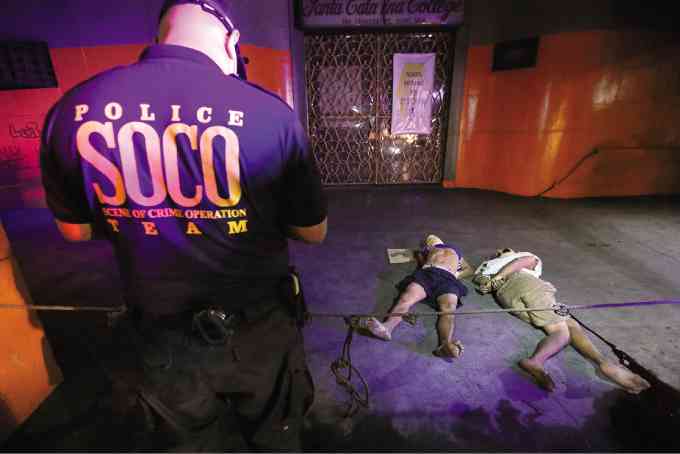
A crime scene investigator of the Metro Manila police inspects the bodies of two men who were linked to illegal drugs and were found dumped on the streets of the metropolis. (FILE PHOTO BY RAFFY LERMA / INQUIRER)
MANILA — An international human rights watchdog has accused the Philippine National Police of “systematically” targeting the poor for summary killing in the name of President Duterte’s “war on drugs.”
A report by the Amnesty International released Wednesday (Feb. 1) “details how the police have systematically targeted mostly poor and defenseless people across the country while planting ‘evidence,’ recruiting deaths squads, stealing from the people they kill and fabricating official incident reports.”
“Incited by the rhetoric of President Rodrigo Duterte, the police, killers on their payroll, and unknown armed persons have slain more than a thousand people a month under the guise of a national campaign to eradicate drugs,” the group said on Tuesday.
According to Amnesty International’s crisis response director Tirana Hassan, the ultimate responsibility for the actions of the PNP lies “at the very top of the government.”
READ: Duterte gov’t ordered, paid killers in war on drugs — AI
She said Duterte’s pledge to continue his campaign after suspending it for now purportedly to cleanse the police ranks of scalawags did not mean that the wave of extrajudicial killings would end.
“It is no secret that corruption is rife among the police. As our report shows, the people who are tasked with upholding law and order have planted ‘evidence,’ robbed victims’ homes and falsified reports,” Hassan said.
“But the ultimate responsibility for the police’s actions lies at the very top of government. The problem is not a few bad policemen but the government’s deadly anti-drug policy,” she stressed.
Meanwhile, the Commission on Human Rights (CHR) said the PNP’s decision to put a halt to the anti-drugs campaign after the scandal over the police abduction-slay of a Korean businessman last October has been a “recognition that the campaign is fraught with flaws and susceptible to abuse.”
“The evil that is sought to be prevented by the Commission is abuse of power by state agents that wantonly disregards adherence to the rule of law, and lack of respect for human rights,” the official rights watchdog said.
READ: Amnesty warns of crimes against humanity in Philippines
CHR reiterated that “the key to the drug problem and criminality is effective law enforcement” and challenged the PNP to “ensure accountability for its actions and justice for all the deaths perpetrated” in the anti-drugs campaign.
“The campaign may be successfully carried out without the need to resort to extra- judicial killings. It must be carried out without allegations of corruption and abuse of power by law enforcement,” it said. SFM
[ventuno id=’ODg1NDg2fHwyMzY4fHwxMDg2fHwxLDIsMQ==’][/ventuno]